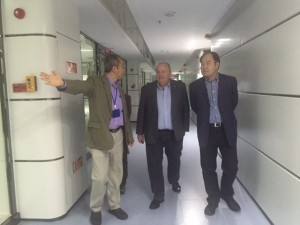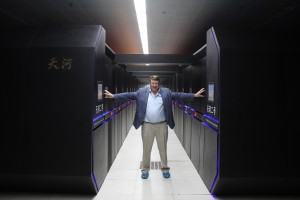15th December 2015 Guangzhou, China
The Second Workshop on SKA Data Processing and HPC at Guangzhou
I attended the works the Second workshop on SKA Data Processing and HPC on 9 December. The workshop is organized by Chinese Ministry of Science and Technology and took place at the National Supercomputer Center—Guangzhou. The mathematicians, engineers, scientists and industrialists exchanged ideas on the challenges and the plans for the computing and data processing of SKA.
(Prof. Philip Diamond, Director-General, SKA Organization and Counsellor Jun Yin, MoST accompanied by Prof.Yuan, Director of NSCC-GZ)
The SKA will be the world’s largest, most sensitive radio telescope facility. Led by a consortium of ten coutnries, it will consist of thousands of linked dishes and antennas across Australia and Southern Africa, goving a combined collecting area of approxiamtely one square kilometre.
The Tianhe-2 computer, based at the National Super Computer Center in Guangzhou remains the fastest publically known computer in the world in the latest edition of the closely followed Top 500 supercomputer ranking, which was published on 16 Nov. 2015. The Hartree Supercomputer Centre signed a collaboration MOU with its Chinese counterpoart in 2014.
UK and China are working more closely together under the SKA fraemwork. This could include big data, astronomy and high performance computing.
(Dr. Mike Ashworth, Hartree Centre STFC with Tianhe-2)

